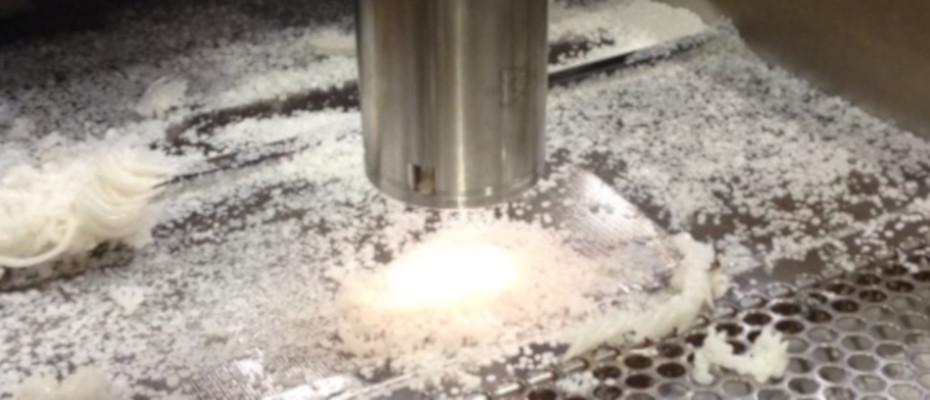In-line spectroscopy (continuous quality control)
Near infra red spectroscopy is widely used in a continuous monitoring manner within the pharmaceutical industry but has to date had limited use in the polymer processing industry. Projects at X-AT and CALMARE have demonstrated its potential for continuous monitoring of aspects such as contamination, moisture, colour and for monitoring materials through the use of tracers.
Research projects include:
Project aimed at demonstrating the suitability of near-infrared spectroscopy for monitoring and detecting contaminants in the polyethylene recycling process.
Current monitoring techniques used in many other recycling techniques, tend to analyse the solid polymer feedstock and are not economically viable for high speed polyethylene recycling operations. This new technique uses near-infrared spectrosopy equipment with multivariate analysis and chemometricmodels to provide an early alert of non-compliance, that can be connected to an automated mechanical separation system. This will enable the production of higher grade recyclate, reduce product failures, production downtime and costs whilst increasing quality of end products.
Partners: British Polythene Industries, Aunir and Bruker
Funded by: Innovate UK
The outputs from this project were:
- Development of a process to recycle currently unrecyclable coloured and barrier-modified PET.
- A post-process quality validation protocol for assuring the consistency of plastics recycling processes for food contact applications with 100% reliability.
- Real time in-line monitoring for process control to verify that the amounts of chemicals meet the required levels.
Partners:
- British Plastics Federation
- Associazone Nazionale Construttori di Macchine e Stampi per Materie Plastiche e Gomma
- European Plastics Converters
- DENTIS srl
- Machinefabriek Otto Schouten B.V.
- Extricom GmbH
- S+S Separation and Sorting Technology GmbH
- Smithers Rapra Technology Ltd
- Fraunhofer Institut für Chemische Technologie
- University of Exeter
- Comite Europieen des Normalisations (CEN) / The National Standardisation Body of the Netherlands (NEN)
- Aliplast S.p.A.
Funded by: European Union's Seventh Framework Programme (FP7/2007-2013) under grant agreement no.285889.
The Optijet project will build on the results of past research that has demonstrated the feasibility of using near infrared spectroscopy as a quality control tool in an injection-moulding machine. This technology will allow injection moulders to monitor and control injection moulding processes in real time. This will bring them significant benefits in terms of increased productivity, cost reductions and improves quality control.
Partners: Optim Test Center (Beligium), Micro Systems (UK) Ltd., FOS Messtechnik (Germany), Cronoplast (Spain), LNL Technology (Turkey), Fundació Privada Ascamm (Spain), Innovació i Recerca Industrial i Sostenible (Spain)
Funded by: European Commission’s Seventh Framework Programme under ‘Research for SME – Associations’
An in-line monitoring tool for scrap reduction and re-use in the plastics industry. This project seeks to address waste minimisation issues within the UK'plastics processing industry. The three major processing methods of injection moulding, extrusion and blow moulding are used to produce the vast majority of plastic products present today on the market. In each of these three processing techniques the issues surrounding the production of scrap and its reuse are essentially the same (though there are differences in scale) therefore the solutions proposed will be applicable across all three sectors.
The objectives of the project are three fold:
- To reduce the reject rate during production by directly monitoring the status of raw materials in-line
- To encourage the reprocessing of a far greater percentage of scrap in the factory
- To investigate the use and efficacy of purging agents in response to industry concerns.
Partners: Colormatrix Europe Ltd., Boots Group Plc, Algram Group Ltd, Becton Dickinson and Company, Data Plastics Ltd, Robinson Plc, Esterform Packaging Ltd, LB Plastics Ltd, Anglo American Vulcanized Fibre Ltd, British Plastics Federation
Funded by: Technology Strategy Board

